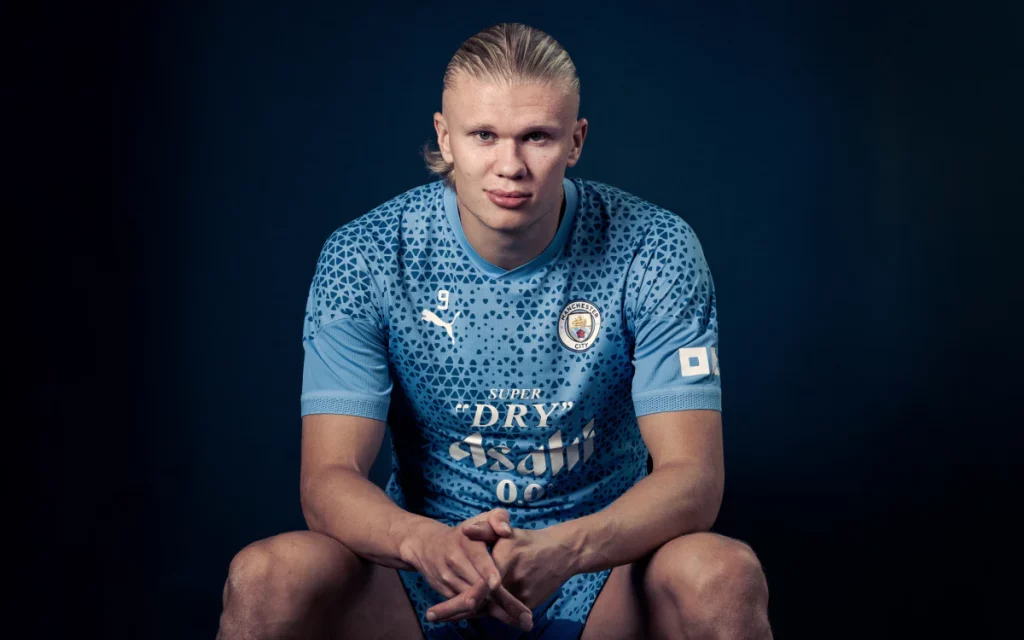The Ballon d’Or is the pinnacle of individual achievement in football, celebrating the player who has had the most outstanding impact in the sport over the course of a season. Erling Haaland, despite his undeniable talent and prolific goal-scoring record, particularly during his first season at Manchester City, has faced arguments against him securing this prestigious award.
Here are 3 reasons why believe Erling Haaland does not deserve the Ballon d’Or:
1. Performance in Critical Matches
While Haaland has been lauded for his goal tally, his contributions in the most pivotal games of the season have often been scrutinized. In major finals and decisive matches, Haaland’s influence has sometimes been less than decisive:
Champions League Final: In the 2022-2023 season, Manchester City clinched their first Champions League title, but Haaland’s performance in the final was not particularly standout. He didn’t score in this match, leaving many to argue that his impact in the biggest game of the club season was minimal. The narrative around his performance in such high-stakes games suggests that while he’s exceptional at accumulating goals across a season, his presence isn’t always felt when it matters most.
FA Cup Final: Similarly, in the FA Cup Final against Manchester United, Haaland was largely kept quiet, with other players stepping up to make the difference. His lack of impact in these critical moments has led some to question whether he truly was the best player in the world for that season.
Consistency in Big Matches: Beyond the finals, there have been instances where Haaland has gone missing in key matches throughout the season. Matches against top-tier competition where defenders have effectively neutralized him, like when he was contained by Arsenal’s defense, underline this point. The Ballon d’Or often rewards players who can consistently perform under pressure, and Haaland’s record in this regard has been mixed.
2. Team Dependency and Style of Play
Erling Haaland’s style of play, primarily focused on being a goal poacher, raises questions about his versatility and overall contribution to the team:
Dependence on Service: Haaland’s goal-scoring prowess is undeniable, but it largely depends on the quality of service he receives. Players like Kevin De Bruyne have been instrumental in providing him with the ammunition to score. This dependency might suggest that his achievements are somewhat team-reliant rather than individually driven, which is a key criterion for the Ballon d’Or. The award often goes to players who can influence the game in multiple ways, not just through scoring.
Limited Role: Unlike some of his contemporaries who have a broader impact across the pitch, Haaland’s game is centered around goal-scoring. His defensive work rate, creativity in midfield, or ability to drop deep and orchestrate play are not his primary strengths. The Ballon d’Or frequently celebrates players who can change games in various facets, not just through goals.
Comparison with Peers: When juxtaposed with players like Lionel Messi, who has shown an unparalleled ability to both score and create, or players like Kylian Mbappé who can impact games in multiple roles, Haaland’s one-dimensional approach might not stand out as much in the eyes of the voters.
3. International Performance and Impact
A significant factor in Ballon d’Or discussions is a player’s contribution to their national team, particularly in major tournaments:
Lack of International Success: Norway, Haaland’s national team, has not been a force in international football, failing to qualify for major tournaments like the World Cup. While a player’s national team performance shouldn’t solely define their Ballon d’Or credentials, the award often goes to players who have had a significant impact on the international stage. Messi’s World Cup victory in 2022 is a prime example where his international achievements bolstered his case for the Ballon d’Or.
No Major Titles for Norway: Since Haaland has yet to lead Norway to any significant international success or even participate in a World Cup or European Championship during the period in question, his international resume lacks the weight that often accompanies Ballon d’Or winners. The award has historically favored players who can elevate their national teams to glory or at least show remarkable performances in international fixtures.
World Cup Influence: The timing of the Ballon d’Or voting often coincides with major international events like the World Cup, where performances can sway voters. Haaland’s absence from such events due to Norway’s non-qualification can be seen as a missed opportunity to showcase his skills on the world stage, potentially impacting his chances.
In nutshell
Erling Haaland is undoubtedly one of the most exciting and effective strikers in football today, with his goal-scoring feats at Manchester City establishing him as a world-class talent. However, the Ballon d’Or is about recognizing the best overall player, considering impact, versatility, and influence across all levels of the game. His performances in crucial matches, the dependency on his teammates for his success, and his lack of international impact provide compelling reasons why some argue he doesn’t yet merit the Ballon d’Or. As his career progresses, Haaland has plenty of time to address these critiques and potentially secure football’s most coveted individual honor.

